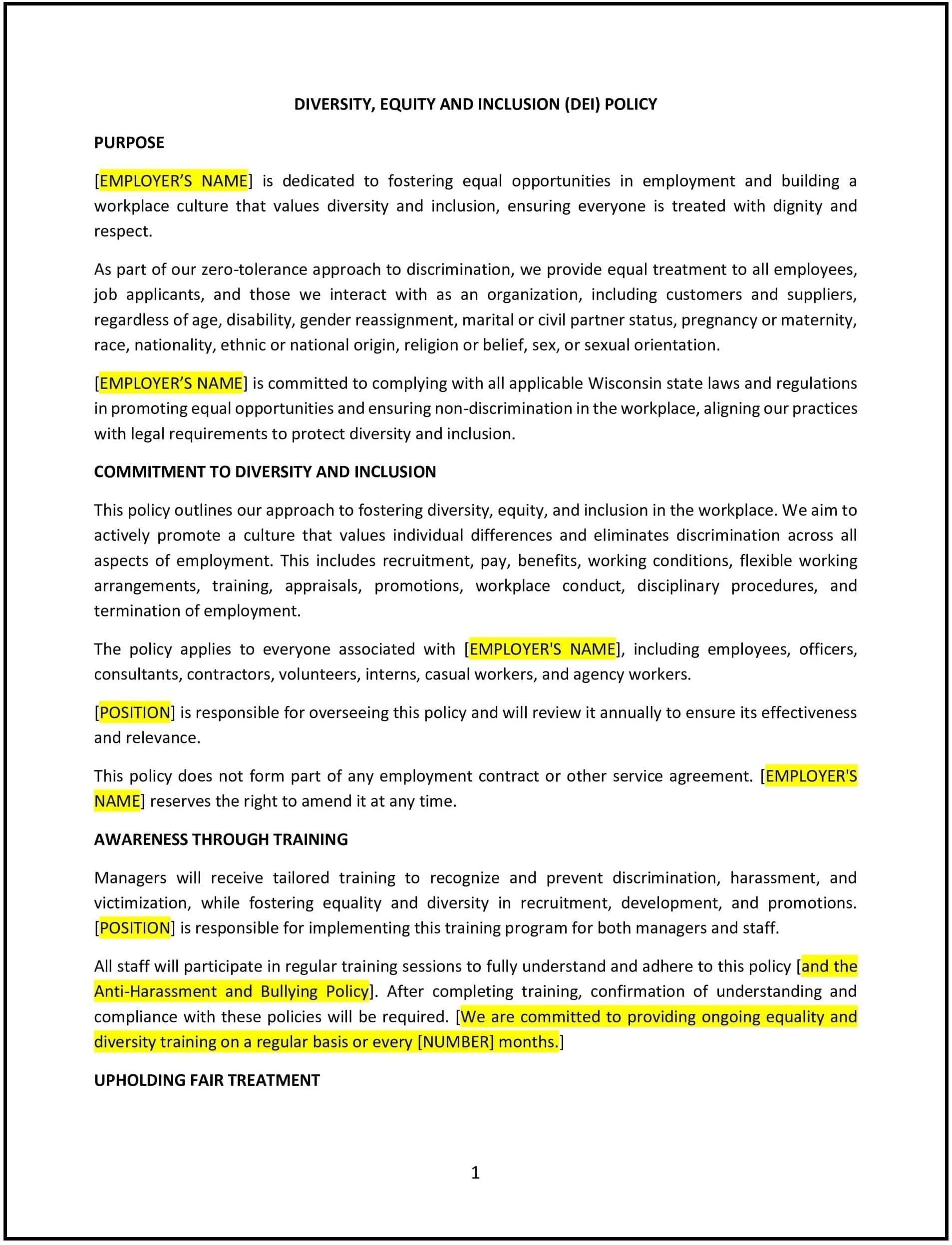Diversity, equity, and inclusion (DEI) policy (Wisconsin)
Got contracts to review? While you're here for policies, let Cobrief make contract review effortless—start your free review now.

Customize this template for free
Diversity, equity, and inclusion (DEI) policy
A diversity, equity, and inclusion (DEI) policy helps Wisconsin businesses establish clear guidelines for fostering a diverse, equitable, and inclusive workplace. This policy outlines the company’s commitment to promoting diversity across all levels of the organization, ensuring equitable opportunities for all employees, and creating an environment where everyone feels respected, valued, and included.
By implementing this policy, businesses can strengthen their organizational culture, improve employee engagement, and ensure they attract and retain top talent from diverse backgrounds, while also improving compliance with federal and state regulations.
How to use this DEI policy (Wisconsin)
- Define diversity, equity, and inclusion: Clearly define what diversity, equity, and inclusion mean for your organization, and outline the key goals you aim to achieve. This includes promoting diversity in race, gender, age, disability, sexual orientation, religion, and other factors.
- Establish clear DEI objectives: Set measurable goals for improving diversity, equity, and inclusion within the company. This could include increasing representation of underrepresented groups, ensuring equal access to opportunities for career development, and fostering an inclusive culture where all employees feel valued.
- Promote diverse recruitment: Ensure that your hiring practices encourage diversity by implementing strategies to attract candidates from a wide range of backgrounds. This may include revising job descriptions to eliminate bias, expanding recruitment efforts to reach diverse communities, and providing training to hiring managers on fair and unbiased selection processes.
- Create a culture of inclusion: Encourage an inclusive work environment where all employees feel they belong. This includes fostering open communication, celebrating diverse perspectives, and ensuring that employees have access to the resources and support they need to succeed.
- Provide equal opportunities: Ensure that all employees have equal access to career development opportunities, training programs, mentorship, and promotions, regardless of their background or identity.
- Address discrimination and harassment: Outline zero-tolerance policies for discrimination, harassment, and bias, and provide employees with clear procedures for reporting any incidents. Ensure that employees are aware of their rights and how to seek support if they face discrimination or harassment.
- Encourage ongoing education and training: Provide regular DEI training for all employees, from leadership to entry-level, to raise awareness of unconscious bias, cultural competency, and the importance of diversity and inclusion in the workplace.
- Measure and track progress: Implement systems to track the company’s progress toward achieving DEI goals, such as conducting employee surveys, reviewing hiring and promotion data, and regularly reporting on DEI initiatives to leadership and employees.
Benefits of using this DEI policy (Wisconsin)
This policy offers several benefits for Wisconsin businesses:
- Promotes a positive workplace culture: A DEI policy fosters an environment where employees feel respected, valued, and included, which can lead to higher morale, job satisfaction, and employee engagement.
- Attracts and retains top talent: A commitment to diversity and inclusion helps attract diverse candidates and retain talented employees by ensuring equitable opportunities for career advancement and personal growth.
- Improves business performance: Diverse teams bring a variety of perspectives, which can lead to better decision-making, problem-solving, and innovation. Inclusive organizations also see improved employee performance, collaboration, and creativity.
- Reduces legal risks: A strong DEI policy helps mitigate the risk of discrimination claims by ensuring fair and consistent treatment of all employees, which can help the company avoid legal disputes and penalties.
- Strengthens reputation: Demonstrating a commitment to diversity, equity, and inclusion enhances the company’s reputation as a socially responsible employer and can improve its standing within the community and industry.
Tips for using this DEI policy (Wisconsin)
- Communicate the policy clearly: Ensure that all employees are aware of the DEI policy, understand its goals, and know how it impacts their work experience. Promote transparency and consistency in how DEI practices are implemented across the company.
- Lead by example: Leadership should set the tone for the organization by modeling inclusive behaviors, supporting DEI initiatives, and holding themselves and others accountable for fostering an inclusive culture.
- Encourage employee involvement: Involve employees in DEI initiatives by creating employee resource groups, hosting events, or providing opportunities for employees to contribute ideas and feedback.
- Provide resources for support: Ensure that employees have access to the resources and support they need to navigate any challenges related to diversity and inclusion. This could include mentorship programs, counseling, or employee assistance programs.
- Review regularly: Review the policy and the company’s progress toward DEI goals on a regular basis to ensure that it remains relevant, effective, and aligned with the company’s values and objectives.